Japanese Overseas Migration Museum 海外移住資料館
|
|
|
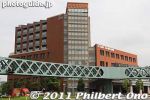
The Japanese Overseas Migration Museum is operated by the Japan International Cooperation Agency (JICA) in Yokohama. There are permanent exhibitions explaining the immigration to Hawai'i, continental USA, and South America.
|
|

There are also changing or special exhibitions so it's worth visiting more than once. Besides exhibition rooms, the museum has a reference library (closed on Sun.) with a collection of 20,000 books and materials about Japan's immigration.It even has kami-shibai (picture card stories). You can browse through recent Japanese novels such as "Japanese-Americans 99 Years of Love."
|
|

Entrance to Japanese Overseas Migration Museum. 10 am - 5 pm (enter by 4:30 pm), closed Mon. (open if a national holiday and closed on Tue. instead) and Dec. 29-Jan. 3.The museum is operated by the Japan International Cooperation Agency (JICA) which is Japan's version of the Peace Corps.
|
|

The museum also has a restaurant with an outdoor terrace (open 11:30 am - 1:30 pm, 5:30 pm - 9 pm).
|
|
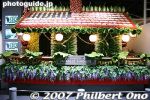
Oregon Japanese farmers
|
|
|

Total number of emigrants from Japan was 760,000.
|
|

This map shows how many emigrated from each prefecture. Hiroshima had a whopping 109,893 number of emigrants.
|
|

Okinawa also had a large number of emigrants: 89,424
|
|
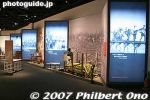
Hawaii exhibit had a Newspaper ad: "Go to Hawaii as a migrant worker and become rich"
|
|
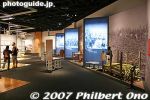
Hawaii emigration exhibit at Japanese Overseas Migration Museum, Yokohama
|
|

Hawaii emigration exhibit at Japanese Overseas Migration Museum, Yokohama
|
|

Kanyaku imin for emigrants to Hawaii
|
|
|
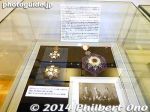
Medals donated by Robert Walker Irwin's granddaughter Yukiko Irwin to the Japanese Overseas Migration Museum. On left is the Royal Order of Kamehameha I, Knights Grand Cross Star. The medal on the right is The Order of the Rising Sun.
|
|
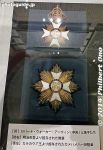
Royal Order of Kamehameha I, Knights Grand Cross Star awarded by King Kalakaua for distinguished service to the king and the people of Hawaiʻi.
|
|

Roster of kanyaku imim laborers to Hawaii. 1885 (replica)
|
|
|

Employee ID tag (bango 番号) from Maui, and a check sent home by an immigrant in Hawaii (replica). 1889
|
|

Passport issued to one of the first Kanyaku-imin emigrants to Hawaii. (Replica)
|
|

History of Japanese emigration to overseas.
|
|

History of Japanese emigration: Embarking on the voyage and emigration restrictions.
|
|

US-Japan Treaty of Amity and Commerce, signed in 1858 in Edo (replica)
|
|

Tariff Convention, signed on July 25, 1866 in Edo. (Replica)
|
|

"Journey to the Americas" exhibit
|
|

Passport dating from 1866-1876. From 1876, the present Japanese word for "passport" (ryoken 旅券) began to be used. Before that it was called "menjo 免状."
|
|
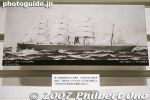
S.S. City of Tokio brought the first Kanyaku Imin to Honolulu, Hawai'i in Feb. 1885 after leaving Yokohama in Jan. A few months later in June 1885, the ship ran aground and sank in Tokyo Bay.
|
|
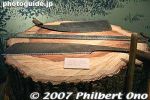
Tools used by Japanese immigrants in Brazil.
|
|

Passports issued to picture brides stopped in 1920. This young couple had a picture marriage right before then.
|
|

Anti-Japanese campaign poster in Washington state, USA, 1921.
|
|

Japanese-Americans during World War II.
|
|

The S.S. Nippon Maru, the last emigrant ship that departed Yokohama on Feb. 14, 1973. Migrants by ship decreased dramatically by the 1960s due to air travel and higher living standards in Japan.
|
|
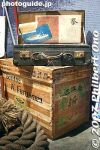
Luggage to Brazil. Crate has marking for Omi-cha tea from Shiga Prefecture.
|
|
|

Guide book for those wanting to emigrate to Hawaii, 1904. (replica)
|
|

What the immigrants brought with them to Brazil.
|
|

Luggage and personal effects brought by the immigrants. This person arrived Brazil in 1931. Japanese footwear, umbrella, sewing kit, hair cutter.
|
|

The person brought a karate uniform when emigrating to Brazil in 1968 and established a karate school.
|
|

Cosmetics
|
|

Medical things and medicines
|
|
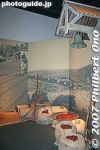
Coffee in Brazil
|
|
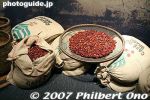
Coffee beans in Brazil
|
|
|
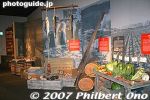
Farmers and fishermen in the Americas.
|
|
|
|

Sports, religion, women's groups, and other Japanese organizations.
|
|

Agriculture
|
|

Japanese schools were started so that the nisei children could learn Japanese and be better prepared when or if their parents decided to move back to Japan.
|
|

Japanese school activities
|
|

Japanese-language newspapers started to be published (mimeographed) from the 1890s in the San Francisco Bay Area.
|
|
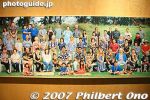
Six-generations of a family on Maui, Hawai'i. They started with immigrants from Yamaguchi Prefecture in 1891.
|
|
|
|
|